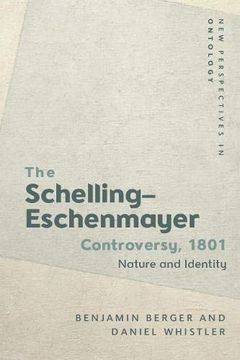Share
The Schelling-Eschenmayer Controversy, 1801: Nature and Identity (New Perspectives in Ontology)
Benjamin Berger; Daniel Whistler (Author)
·
Edinburgh Univ Pr
· Hardcover
The Schelling-Eschenmayer Controversy, 1801: Nature and Identity (New Perspectives in Ontology) - Benjamin Berger; Daniel Whistler
£ 81.00
£ 90.00
You save: £ 9.00
Choose the list to add your product or create one New List
✓ Product added successfully to the Wishlist.
Go to My WishlistsIt will be shipped from our warehouse between
Monday, June 10 and
Wednesday, June 12.
You will receive it anywhere in United Kingdom between 1 and 3 business days after shipment.
Synopsis "The Schelling-Eschenmayer Controversy, 1801: Nature and Identity (New Perspectives in Ontology)"
A study of the genesis of Schelling's philosophy of nature and absolute idealism, highlighting the importance of his critic Eschenmayer During the first decade of the 19th century, F. W. J. Schelling was involved in 3 distinct controversies with one of his most perceptive and provocative critics, A. K. A. Eschenmayer. The first of these controversies took place in 1801 and focused on the philosophy of nature. Now, Berger and Whistler provide a ground-breaking account of this moment in the history of philosophy. They argue that key Schellingian concepts, such as identity, potency and abstraction, were first forged in his early debate with Eschenmayer. Through a series of translations and commentaries, they show that the 1801 controversy is an essential resource for understanding Schelling's thought, the philosophy of nature and the origins of absolute idealism. Additionally, Berger and Whistler demonstrate how the Schelling-Eschenmayer controversy raises important issues for the philosophy of nature today, including questions about the relation between identity and difference and the possibility of explaining sensible qualities in terms of quantity. This ultimately leads to the formulation of the most basic methodological question for the philosophy of nature: must this philosophy be based upon a prior consideration of consciousness - as Eschenmayer insists - or might it simply begin with nature itself? By arguing for the latter position, Schelling challenges us to entertain the possibility that the philosophy of nature is first philosophy.
- 0% (0)
- 0% (0)
- 0% (0)
- 0% (0)
- 0% (0)
All books in our catalog are Original.
The book is written in English.
The binding of this edition is Hardcover.
✓ Producto agregado correctamente al carro, Ir a Pagar.

